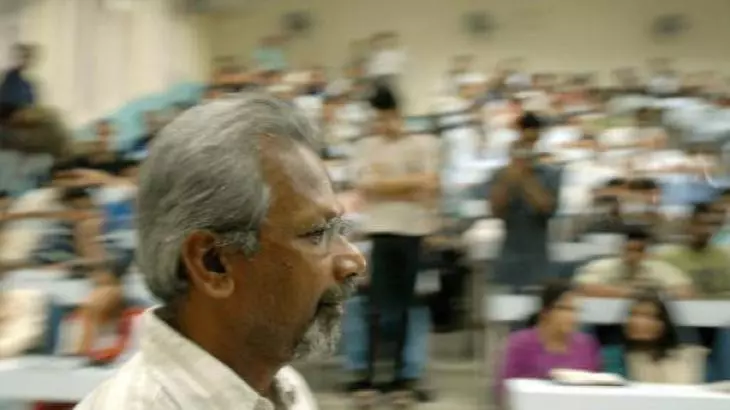
Film production and exhibition will dramatically change post Covid: Mani Ratnam
by NARAYANAN VAce film maker Mani Ratnam on Thursday said that the film production and exhibition business will see a dramatic change in the post-Covid world.
“The film industry has witnessed changes in earlier days, especially production and exhibition have seen lots of changes taking place in terms of the way films were shot and released,” Mani Ratnam said, adding, “every time production and exhibition was reinvented, the whole cycle adapted and changed. However, this time the change has come from an external source.”
The film maker was speaking at a webinar session on ‘The future of Movies & Entertainment’, along with Shibasish Sarkar, CEO, Reliance Entertainment, anchored by journalist TS Sudhir. The webinar was part of the Southern India Chamber of Commerce and Industry’s (SICCI) Webinar series II.
“The game has changed but we will carry on, everything will find its own way,” Ratnam added.
Mani Ratnam, who is currently directing his dream project Ponniyin Selvan, a Tamil historical drama, said that while the two ends of the production cycle ― pre and post production ― will not be affected much, production will see a dramatic change in the post-Covid world.
“I am in the middle of a film based on the 10th century and I have a lot of sequences that require crowd and effort. I don’t know how I am going to do that but I know for sure I will do,” the film maker said, pointing out that technologies such as computer graphics (CG) will greatly help film makers.
“We will have to find different ways to adapt and get into a situation where we make sure we are protected both in terms of hygiene and during actual execution,” the film maker said.
“We should not just jump the gun but learn step by step from people who are shooting outside,” he added.
On the film exhibition business, Ratnam said film exhibitors need to find ways to keep people safe. And once people are sure and confident of coming to the theatres, the industry will bounce back to normal.
“There is no other way of watching a cinema at its best other than on a screen, with 500 other people in the darkness and watching the magic happening in front of us,” Ratnam said.
“We possibly require a little bit of help. Since immediate theatre releases will be difficult and the market will be eroded, I need to bring down the cost of production to make film making viable,” Ratnam, who is co-producing Ponniyin Selvan along with Lyca Productions, said.
The film maker said that big stars and technicians will have to understand and help reduce their prices to keep the film industry afloat.
Making a case for government support, Ratnam said, “This industry is not simply for entertainment. We put hope into people, dreams into them, we put a smile on their faces, it takes a lot of time and effort.”
Shibasish Sarkar of Reliance Entertainment said the cost of production will weigh on the minds of producers in future since three of their major revenue streams ― domestic theatre, overseas theatre and broadcasting rights, have been impacted by the pandemic.
“The global economy almost got into recession in the last two months and broadcasters have lost almost 85 per cent of their ad revenues,” Sarkar said, adding, “so if the broadcasters are not going to earn money, they are not going to pay the same amount of money for the satellite, and we have to be aware to embrace that fact.”
Reliance Entertainment’s upcoming films ‘Sooryavanshi’ and ‘83 The Film’ were scheduled for release in March and April respectively. The releases were postponed due to theatre shutdowns across the country as a result of the Covid-19 pandemic.
Sarkar also added that digital revenues are going to get stronger and all stakeholders, not just producers, should discuss and estimate new revenue streams and structure their projects accordingly.
“In the last two years, both the global OTT platforms as well as the theatre industry have seen the biggest growth. So, it is not cannibalising,” Sarkar said.
“If there is interesting content, consumers will go to the theatre to watch it, vis-a-vis a section of consumers who will go back to OTT at home and consume a different content. I think both will grow,” he added.